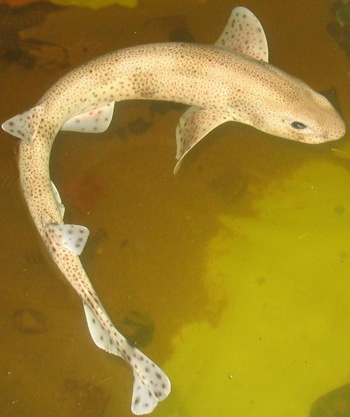One of Scotland’s most successful biotech companies is pioneering new drug discovery techniques using the immune system of sharks after striking a significant deal with the University of Aberdeen.
Award winning Haptogen - which will be using shark antibodies to create new therapies for delivering drugs to combat key diseases like cancer – has obtained the licensing rights for the technology that was developed at the University of Aberdeen.
The move means Haptogen – which was spun out from the University in 2002 and whose founders won 2005's Ernst and Young UK Entrepreneur of the Year Award for Science and Technology – can now further commercialise the research which they believe will lead to better and more effective treatments.
The partnership agreement will also generate a brand new revenue stream for the University which will get a share of the royalties and other performance related income. And it consolidates Aberdeen's position as an international centre for excellence in biologics - one of the fastest growing areas of drug discovery.
Antibodies are disease fighting proteins in the blood created by the immune system which tackle bacteria, viruses and other foreign substances.
Shark antibodies are the smallest antibodies found in the animal kingdom. Sharks have been around since before the dinosaurs and this may explain why they have had time to generate such an interesting and potent immune system
The University of Aberdeen has developed an approach that will allow the creation of a massive "library" of shark antibodies constructed from small blood samples taken from a few live sharks. Haptogen has created a technology that can browse this library and locate the antibody most suited for tackling specific diseases.
Harnessing the technology for drug delivery means Haptogen can take a new class of drugs to areas or organs of the body that are considered difficult to treat such as the brain or solid cancer tumours. The technology also means they can create new methods for getting biologic drugs into the body including via the lung or even orally. This class of drugs are traditionally administered by injection.
Details of the licensing deal are being announced today (Thursday) at the University of Aberdeen's prestigious Open for Business event which is a showcase of just some of the institution's commercially focused research.
Professor Dominic Houlihan, Vice Principal for Research and Commerce, will tell guests at the event, which will provide businesses with opportunities for collaboration within the major sectors of medicine and healthcare, renewable energy and oil and gas, that Haptogen is just one of the University's many success stories.
The Haptogen deal is also good news for Scottish Enterprise which awarded funding to researchers Professor Andy Porter, Chair of Biotechnology at the University of Aberdeen, and Professor Chris Secombes, Head of the School of Biological Sciences, from its Proof of Concept Programme which supports leading technologies and aims to help export innovation from the lab into the global marketplace.
Jim Reid, Chief Executive Officer of Haptogen Ltd, said: "Haptogen is delighted that through this licensing deal it is able to realise the commercial potential of shark antibodies. The shark platform further adds to Haptogen's technology offering and maintains Haptogen's position as a leading innovator in the area of biologic drug discovery."
Professor Porter said: "The small size and robustness of shark antibodies when combined with Haptogen's powerful new drug screening techniques will produce a new generation of potent and safe drugs that can specifically target some of society's most serious killers like cancer and infectious disease."
Professor Houlihan said: "The original research was funded purely as an exercise in fish biology but then the scientists involved realised there was real potential in using these shark proteins to detect and prevent disease.
"The next major step was funding from the Scottish Enterprise Proof of Concept Fund and now the announcement today is that one of our spinout companies Haptogen Ltd and the University of Aberdeen have signed a licensing agreement. This is a tremendous example of blue skies thinking leading to commercial potential. "
Eleanor Taylor, head of Proof of Concept Programme for Scottish Enterprise, added: "It is exciting to see a Scottish company continuing to develop and grow. This technology started its journey by participating in our Proof of Concept Programme, one of Scottish Enterprise's initiatives that is taking Scotland's technological breakthroughs and innovations out of the lab and transforming them into businesses that can become world leaders in their field. This announcement supports the decision announced last week to invest a further £30m in the Programme.


